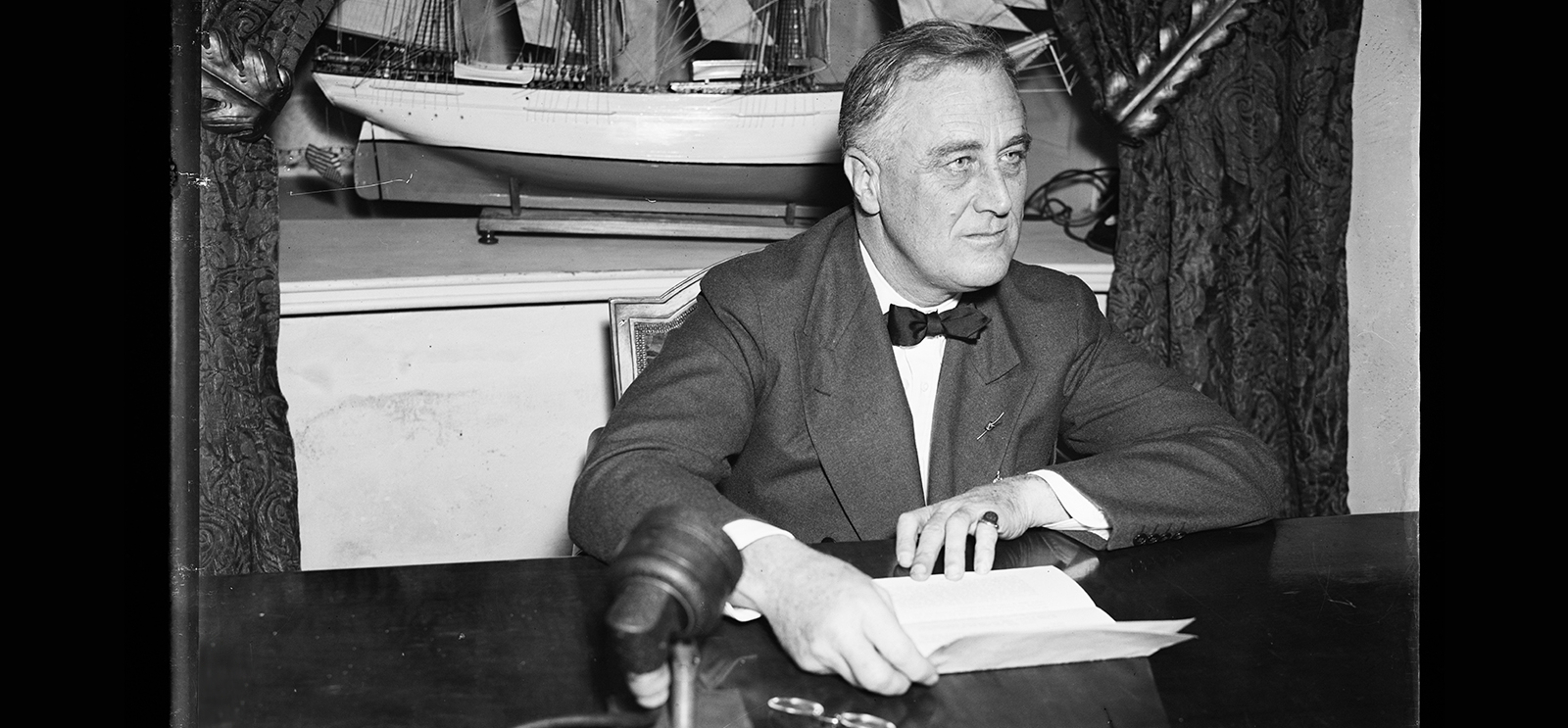
Roosevelt, 1936. (Library of Congress, LC-DIG-hec-47189)
Socialists squeak by Communists! Impostor students! And more from the straw poll of 1936.
For a week in late October 1936, the Daily Maroon (as the student newspaper was then called) updated the University of Chicago community on the results of a student straw poll it was conducting just before November’s presidential election.
Articles about the poll ran at the top of the paper’s crowded front page all week, sitting alongside other news items—an announcement of Clarence Darrow’s new lecture series, an interview with Heisman Trophy winner Jay Berwanger, AB’36, about his star turn in the football drama The Big Game. Voting ran over three days, beginning on Tuesday, October 20, and ending Thursday evening. By Friday morning, the Maroon had the results: Democrat Franklin D. Roosevelt captured more than 55 percent of the student vote (1,420 ballots), soundly beating Republican runner-up Alf Landon, who garnered around 30 percent.
Even more intriguing was the race for third place: the Socialist Party’s Norman Thomas triumphed over Communist Earl Browder by a single vote, 206 to 205. (Despite Browder’s loss, his family’s place in UChicago’s history has since been firmly cemented. His son, Felix Browder, was a professor of mathematics for 23 years, later winning the National Medal of Science. One grandson, William Browder, AB’85, became an outspoken critic of president Vladimir Putin after one of his lawyers died in a Russian prison.)
Rounding out the national candidates was William Lemke of the populist Union Party. Lemke scraped together seven votes, just enough for a narrow five-vote victory over the president of the University, Robert Maynard Hutchins. The pair of ballots cast for Hutchins weren’t the only joke votes: “To the question ‘aside from your presidential choice, what party do you favor?’ two answered ‘birthday,’ one ‘Boston Tea,’ one ‘necking,’ and one ‘snowbird,’ what ever that is,” the Maroon reported. Another student, when asked what division of the University they were in, simply responded “long.”
Unlike the previous election—which the Maroon noted had been “heavily stuffed,” to the extent that perhaps a third of the votes were fraudulent—voting procedures for the 1936 straw poll were quite stringent. After voting students were required to present a tuition receipt, which the poll clerks would sign. Still, a certain amount of deceit may have occurred. “In some cases, ink eradicators were used to remove the marks on the tuition receipts; in others, students presented more than one receipt for the current quarter or showed receipts for previous quarters which harassed poll clerks failed to detect as invalid,” wrote the Maroon.
Deception had crept in at the paper too, where it turned out that one associate editor, Cody Pfanstiehl, was only masquerading as a student. Pfansthiehl attended UChicago from 1934 until 1937, where he occupied the role of everything from gossip columnist to head drumbeater at football games and authored much of the Maroon’s election coverage. But as a Washington Post obituary reveals, he was never actually registered at the University. When the administration cottoned onto him, though, he wasn’t kicked out—instead, the public relations department hired him. From there he went on to a career in radio, eventually becoming head spokesperson for the DC Transit Authority. He retired in 1982, a year after the Downtown Jaycees named him one of its Washingtonians of the Year. Back in 1936, the on-campus campaign itself was, by all reports, fairly heated. The day before the straw poll there was an “Olde Tyme Politicale Hustings” on campus. (A “hustings” is a meeting where candidates, or their representatives, make a speech in favor of themselves.)
In the run-up to the event, the Maroon provocatively asked those considering an appearance if they wanted to “give Thomas ‘the bird.’” Maybe it was this sort of needling that led what the Maroon called an “authoritative source” to suggest, perhaps a little sniffily, that so-called socialists voting for FDR “aren’t real socialists. They’re just a liberal fringe.” The president of the University’s Socialist Club concurred, commenting in the Maroon that “the outcome of the elections shows, unfortunately, that many of the liberals have been taken in by the Roosevelt smile.” The “Roosevelt smile” proved seductive on the national scale as well. Two weeks later, FDR defeated Landon in a landslide—the Republican managed only eight electoral votes, all of them from Vermont and Maine. In Chicago, Roosevelt took two-thirds of the vote.
